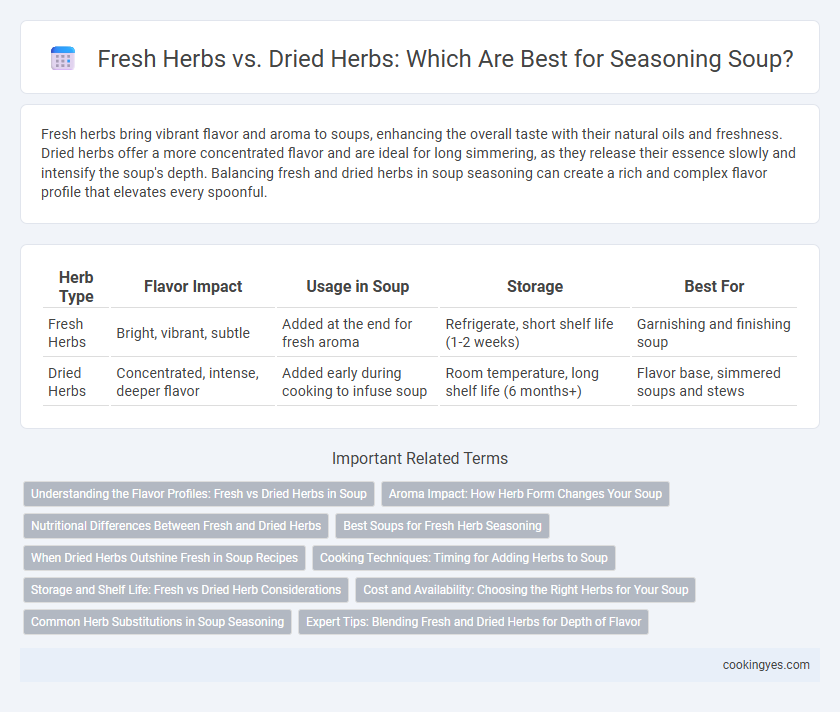Fresh herbs bring vibrant flavor and aroma to soups, enhancing the overall taste with their natural oils and freshness. Dried herbs offer a more concentrated flavor and are ideal for long simmering, as they release their essence slowly and intensify the soup's depth. Balancing fresh and dried herbs in soup seasoning can create a rich and complex flavor profile that elevates every spoonful.
Table of Comparison
| Herb Type | Flavor Impact | Usage in Soup | Storage | Best For |
|---|---|---|---|---|
| Fresh Herbs | Bright, vibrant, subtle | Added at the end for fresh aroma | Refrigerate, short shelf life (1-2 weeks) | Garnishing and finishing soup |
| Dried Herbs | Concentrated, intense, deeper flavor | Added early during cooking to infuse soup | Room temperature, long shelf life (6 months+) | Flavor base, simmered soups and stews |
Understanding the Flavor Profiles: Fresh vs Dried Herbs in Soup
Fresh herbs in soup provide vibrant, bright flavors with delicate herbal notes that often release essential oils when added towards the end of cooking, preserving their fragrant qualities. Dried herbs offer concentrated, intensified flavors due to the moisture removal process, which enhances their potency and allows them to infuse deeply into the soup during longer simmering times. Understanding these distinct flavor profiles helps optimize seasoning techniques, balancing fresh herbs for finishing touches and dried herbs for foundational depth in soup recipes.
Aroma Impact: How Herb Form Changes Your Soup
Fresh herbs release vibrant essential oils that create a bright and complex aroma, elevating the sensory experience of soups with their lively fragrance. Dried herbs concentrate flavors due to moisture loss but often lack the nuanced aroma intensity of fresh versions, sometimes imparting a more muted or earthy scent. Selecting fresh herbs enhances a soup's aromatic profile significantly, making it an ideal choice for dishes where aroma is a key component of flavor perception.
Nutritional Differences Between Fresh and Dried Herbs
Fresh herbs retain higher levels of vitamin C and certain antioxidants, enhancing the nutritional profile of soups more effectively than dried herbs. Dried herbs offer concentrated flavors but often have reduced vitamin content due to the drying process. Incorporating fresh herbs into soups can boost nutrient intake with added antioxidants and vitamins that support immune health.
Best Soups for Fresh Herb Seasoning
Fresh herbs such as basil, cilantro, and parsley provide vibrant flavor and bright aroma ideally suited for light soups like vegetable, chicken, and seafood soups. These herbs release their essential oils quickly, enhancing the fresh, clean taste and delicate broth without overpowering the dish. Using fresh herbs at the end of cooking or as a garnish preserves their texture and maximizes the herbal essence in soups like minestrone, gazpacho, and chicken noodle.
When Dried Herbs Outshine Fresh in Soup Recipes
Dried herbs concentrate flavors over time, making them ideal for soups that simmer for extended periods, as their potency infuses deeply into the broth. They retain their aromatic oils better than fresh herbs during long cooking, ensuring a robust and consistent taste throughout the dish. Using dried thyme, oregano, or bay leaves elevates slow-cooked soups by releasing intensified essential oils that fresh herbs might lose during prolonged heating.
Cooking Techniques: Timing for Adding Herbs to Soup
Fresh herbs release their vibrant flavors best when added near the end of the cooking process, preserving their aroma and bright taste in soups. Dried herbs require longer simmering times, allowing their essential oils to infuse thoroughly into the broth for a deeper, more robust flavor. Proper timing enhances the herb's potency and balances the overall seasoning, ensuring an optimal soup profile.
Storage and Shelf Life: Fresh vs Dried Herb Considerations
Fresh herbs offer vibrant flavors for soups but require refrigeration and typically last only about 5 to 7 days before wilting. Dried herbs, stored in airtight containers away from light and heat, maintain potency for up to 1 to 3 years, making them a convenient long-term seasoning option. Proper storage significantly influences the shelf life and flavor intensity of herbs used in soup seasoning.
Cost and Availability: Choosing the Right Herbs for Your Soup
Fresh herbs often cost more than dried herbs but offer a vibrant flavor that can elevate the taste of soups significantly. Dried herbs are more affordable, have a longer shelf life, and are widely available year-round, making them a practical choice for consistent seasoning. Selecting the right herbs depends on budget considerations and accessibility, with fresh herbs best used when in season and dried herbs providing cost-effective convenience.
Common Herb Substitutions in Soup Seasoning
Fresh herbs like parsley, cilantro, or basil offer vibrant flavor and aroma to soups but can be substituted with dried counterparts when fresh options are unavailable. Common herb substitutions include replacing fresh thyme with dried thyme at a ratio of 1:3, or using dried oregano instead of fresh basil to maintain robust herbaceous notes. Adjusting quantities is crucial because dried herbs are more concentrated, ensuring balanced seasoning and enhanced soup flavor.
Expert Tips: Blending Fresh and Dried Herbs for Depth of Flavor
Expert chefs recommend blending fresh herbs like basil, parsley, or cilantro with dried counterparts such as thyme, oregano, or rosemary to achieve a balanced depth of flavor in soups. Fresh herbs provide bright, vibrant notes best added at the end of cooking to preserve aroma, while dried herbs release robust, concentrated flavors during simmering. Combining both types enhances complexity, layering freshness with earthiness for a rich, well-rounded soup seasoning.
Fresh Herbs vs Dried Herbs for soup seasoning Infographic

 cookingyes.com
cookingyes.com